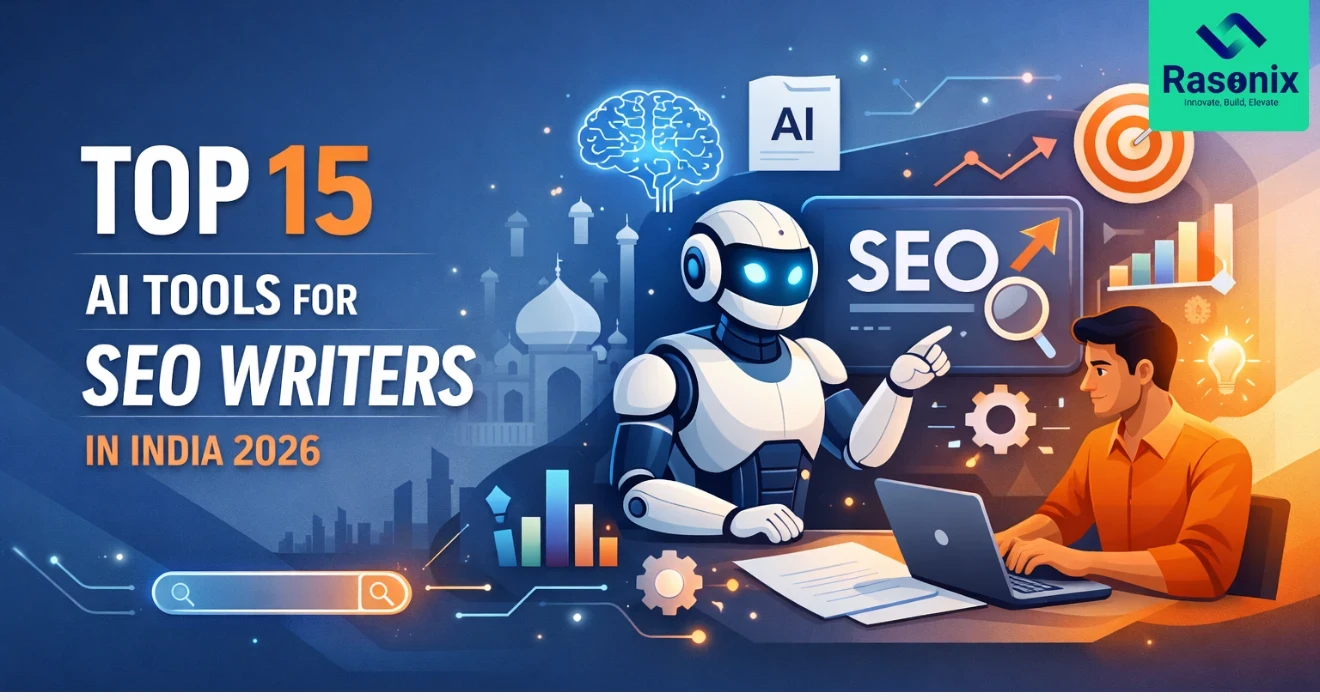In this wild-fast digital age, it seems like everything's at warp speed, particularly when generating content. Overnight, AI solutions are appearing all over the place, claiming to spit out articles, product descriptions, and even those clever social media posts we're all secretly awful at. It's tempting, right? But then that voice in your head starts wondering is AI killing my SEO?
Let's get real for a moment. The short answer isn't a straightforward yes or no. Consider this: AI in and of itself isn't the bad guy in our SEO tale. It's just how we're using it. If we simply let the robots do all the work and spit out generic content, sure, that's likely not going to get us any points with Google or our readers. You're aware of that moment when you're reading something and it feels wrong? Like a machine attempted to compose it? That's what we don't want.
Search engines, particularly the large G (Google), are all about providing folks with what they're searching for – useful, unique content by humans for humans. And if your website gets stacked with spammy, computer-like posts that don't provide anything new, well, you could watch those bounce rates go through the roof, engagement tank, and, yep, those highly-valued rankings could suffer. So, in this guide, let's cut to the chase. We'll learn how to identify the AI-generated material that could be holding you back, and most importantly, how to produce content that reads like it was written by a human, engages your readers, and improves your SEO in the long term. It's about getting that sweet spot where AI can assist, but our human touch is evident.
Let's Get Real About What Google Thinks of AI Content

To truly get a sense of how AI content fits into SEO, we have to look behind the scenes and get a sense of where Google is at. They haven't gone out and stated, "AI content is the devil!" They've said that AI-created content isn't necessarily a no-no in and of itself. Their primary concern, as it has always been, is how helpful and good the content is out there, regardless of who or what wrote it.
But the kicker is the "quality and helpfulness" aspect, which is where pure AI content starts to get into trouble. Google has these fundamental principles known as E-E-A-T Guidelines - Experience, Expertise, Authoritativeness, and Trustworthiness. Consider it, can a machine possibly bring experience to the table? Can it possibly show expertise in the same fashion a trained human could? That's the problem. If your content doesn't have that real depth, those unique perspectives that result from true understanding, Google's probably gonna rate it lower, regardless of how sophisticated algorithms were employed to produce it.
Back that big "Helpful Content Update", right? That was an explicit alert. They're clamping down on sites that are simply mass-producing content to rank, without actually assisting people. Pages loaded with all those generic, AI-written pieces that don't provide much value? They're the ones that are most likely to lose visibility. So, while Google isn't going to ban AI content entirely, they're certainly indicating that it has to be great, really great, and ultimately, for humans. To be successful in your SEO, AI must get a good human makeover.
Seeing the Robots: What Does AI Content Look Like (and Why Google May Not Be a Fan)
Right, so how do you identify AI-generated content that's potentially causing more bad than good for your SEO? It's similar to working out whether someone is smiling naturally or just pretending - there are little giveaways. Knowing these warning signs is the start of grasping why simply allowing AI to go haywire with your content isn't the most brilliant plan.
- Cliched and Repetitive Language: Ever read something and think, "Haven't I read this same sentence somewhere before?" That's a surefire sign. AI models are trained on huge amounts of existing text, so they can sometimes resort to familiar phrases and expected sentence patterns. It's like they're in a rut, and your content ends up missing that spark of originality that makes it memorable. Imagine it as a recipe blog where each recipe introduction employs the same sentence regarding the pleasure of cooking.
- No Personal Experiences: AI has not lived, has not experienced those "feelings!" moments or those maddening learning curves. So, it simply can't weave in those true first-hand observations, those "let me tell you about the time I." anecdotes, or those personal tales that make reading interesting and build credibility. Suppose a parenting blog is composed solely by AI - it may present you with facts regarding sleep training, but not that funny episode when your toddler escaped from the crib at 3 AM.
- Inconsistent Voice: Ever read something in which the tone veers wildly from one minute to the next? One moment it's super formal, and the next, it's attempting to be your buddy. That can be an indication of AI attempting to flex without a definitive sense of what your brand personality is. Having a consistent voice is essential for creating a relationship with your audience.
- Outdated or Incorrect Info: AI models learn from history, and that history isn't always absolutely current. Depending solely on AI for facts means that your content will include out-of-date industry trends, erroneous regulations, or plain wrong facts. This can destroy your credibility. Consider an AI writing about the newest phone models - it could miss the latest releases or features.
- Keyword Overload like a Robot Obsessed: Remember the old days of just stuffing keywords into content? AI, if not properly guided, can sometimes fall into this trap, repeating keywords way too often and in a way that sounds unnatural. Google's way too smart for that now, and it penalizes this kind of behaviour.
- Low Engagement & High Bounce Rates: What do individuals do when they come across content that is dull, uncreative, or simply misses the mark? They press the back button. High bounce rates and low time on the page inform Google that your content is not offering value, and that can most certainly damage your rankings.
Why Letting the AI Robots Run Wild Can Mess Up Your SEO

The promise of endless content at lightning speed is tempting, but just letting AI generate everything without a human in the loop can backfire when it comes to your SEO.
- Google's "No" to Low-Value Stuff: Google's getting good at sniffing out content that's just there to rank, without actually offering anything useful. Websites that employ AI to churn out buckets of generic content risk being flagged for "thin content." It's like presenting a plate of air – it may appear to be something, but there's no substance to it. Google doesn't enjoy that, and it can have a major impact on your search visibility.
- Missing That Human Touch (E-E-A-T): Do recall E-E-A-T? Experience, Expertise, Authoritativeness, Trustworthiness. AI can write words, but it cannot provide that real human touch, those battle-won experiences, or that inherent expertise that commands trust with your viewers and with Google. Particularly in significant topics such as health or finance (YMYL niches), this absence of human credibility can become a big problem.
- Losing Your Readers' Trust: Humans are intelligent. They can usually sense when they're reading something that has been produced by a computer. If your content comes across as being soulless and doesn't resonate with them on a human level, you'll find it difficult to gain a loyal following. And a loyal following is key to long-term SEO success.
- Blending In Rather Than Staying Out: In the crowded internet world, you must stand out with a one-of-a-kind voice, something that makes you stand out from the crowd. AI content doesn't quite have that crisp personal touch, making it more challenging for your brand to be noticed among the competition. You risk becoming another drop of water in the sea of online content.
How to Write Content That Truly Feels Like It Was Crafted by a Human
Alright, so how do we hit that sweet spot? How do we leverage AI for assistance without sacrificing that all-important human touch that readers and search engines alike are hungry for? Here's your blueprint for writing high-ranking content that captures and retains your readers' attention by fixing real problems. As a real person rather than simply spewing out content for its own sake, consider what your audience is going through. What questions are they asking? What problems are they attempting to resolve? Set your focus on crafting content that delivers authentic answers, real-world solutions, and actual value.
- Sprinkle in Your Stories and Experiences: Don't be afraid to share your own experiences, both the wins and the losses. Talk about your journey, share behind-the-scenes glimpses, and use real-world examples to illustrate your points. This adds a layer of authenticity and makes your content much more relatable.
- Share Your Special Insights: Do more than simply summarize facts. Provide your special insights, re-analyze data from a different perspective, or give opinions you've developed through your work or research. Better yet, if you can create original research or case studies. This makes you a genuine authority on your subject.
- Speak as You Speak to a Friend: Forget the stiff formal language. Write conversationally, as if you were addressing your reader personally. Use accessible language, tell anecdotes, and let your personality come through. This makes your content so much more pleasant to read and more accessible to connect with.
- Let Your Brand's Personality Shine: What is it about your brand that makes it stand out? Is it funny? Professional? Approachable? Ensure that personality shines through in all of your content. Consistency in your brand voice creates recognition and trust with your audience.
- AI as Your Sidekick, Not the Star: Imagine AI as a useful tool in your content toolbox. Employ it for generating ideas, structuring your articles, assisting with preliminary research (but always verify!), or even grammar-checking. But always, always include your human element – your perspective, your voice, your critical thinking.
- Mix It Up: Don't Just Use Text: Individuals interact with content differently. Use videos, infographics, podcasts, interactive items, and stimulating visuals to get your content noticed and shared more.
Making Your Awesome Human Content Rank: SEO Tips That Still Matter

Even the most human-sounding content requires a dash of SEO affection to be heard. Here's how to do it the right way:
- Know What People Are Searching For (Keyword Research): Identify the words and phrases that your target audience is using when they are searching for information about your topic. Use keyword research tools to identify these terms and learn their search volume.
- Season Those Keywords Naturally: After you have your keywords, naturally integrate them in your title, headings, subheadings, introduction, body paragraphs, and conclusion. Don't shoehorn them in - you want to sound natural but still flag to Google what you are writing about.
- Make Your Snippets Click-Worthy (Meta Titles & Descriptions): Write effective meta titles and descriptions with your primary keywords and make users want to click on your link in the search results. It's your first impression.
- Internal & External Linking: Link to other useful pages within your website to keep people reading and make it easier for Google to grasp your site structure. Also, link out to quality, authoritative external sources to add credibility and provide additional value to your readers.
- Show Off Your Visuals (Image & Multimedia Optimization): Use descriptive file names and alt text on your images, including keywords. Optimize the file sizes of your images and videos so your pages load fast.
- Think Mobile First (Mobile Optimization & Page Speed): Ensure your site and content appear amazing and work perfectly on every device, particularly smartphones. Also, aim for fast page load speeds - no one enjoys waiting for a slow site.
- Get the Word Out (Content Promotion & Social Signals): Promote your great human content on social media, through your email newsletter, and in other online communities. This drives traffic and engagement, which can improve your SEO indirectly.
Conclusion
Finding That Perfect Human-AI Balance for SEO Success. So, is AI killing your SEO? Not necessarily. But if you're using it exclusively without that all-important human touch, you may be on a bumpy ride. Google favours content that's high-quality, genuine, and made with people in mind. Your number one priority should always be to produce valuable content that speaks to your audience.
To keep your SEO strategy strong in this AI world:
- View AI as a useful support, not your whole content department.
- Inject your own experience, specialist insights, and unique human innovation into your content.
- Search engine optimization, yes, but at all times focus on the needs of your customers.
- Continually learn, modify, and mature your content game as the face of SEO continually changes.
By concentrating on producing content that's useful, unique, and interesting, you can not only thrive in the AI age but also establish a solid, long-term SEO strategy that produces tangible results. So go ahead, write for humans, and see those rankings follow.
Are You Set to Enhance the SEO and Content Strategy of Your Website?
At Rasonix, we focus on building premium quality, user-friendly content to drive SEO best practices. Whether you are looking for an enticing business webpage, an SEO-driven eCommerce site, or a captivating blog to generate traffic, we can simply make it happen. Check out our Complete SEO Packages
Special Offer: Share Review and get up to $500 OFF your first project with us!
Contact Us Today and Boost your online presence to the next level with Rasonix!





















 Subscribe Now
Subscribe Now